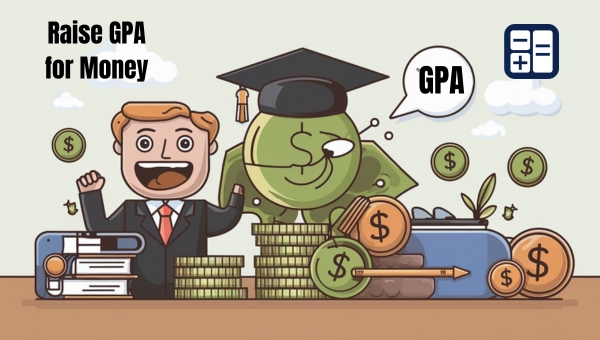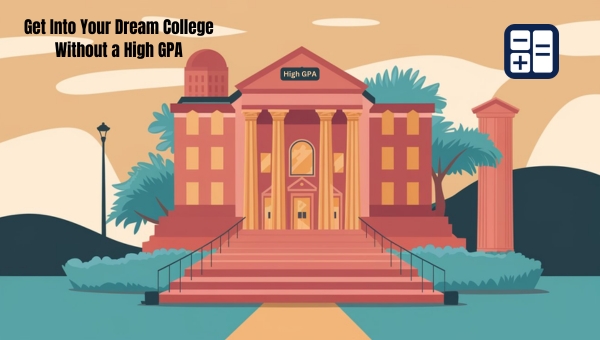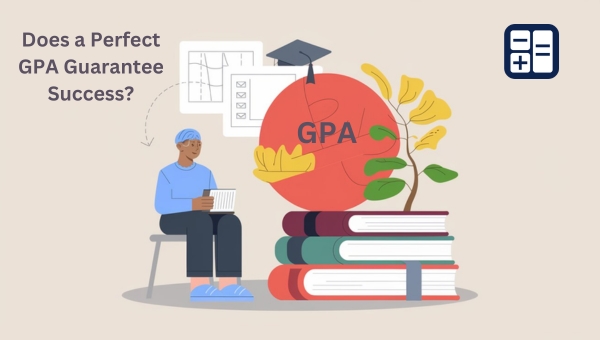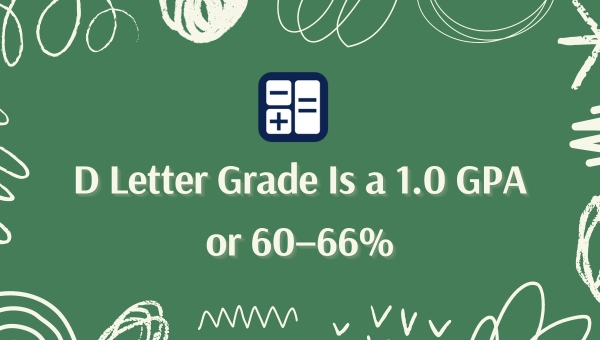C Letter Grade Is a 2.0 GPA or 73–76%
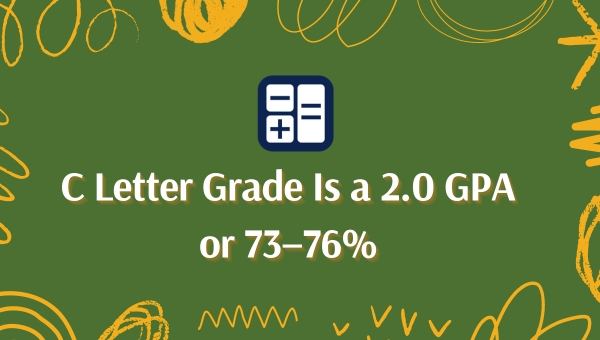
You might be wondering what a C GPA really represents and how it impacts your academic journey. With a 2.0 GPA or a score range of 73-76%, a C grade indicates average performance—neither exceptional nor failing.
But what does this mean for you as a high school student, especially when aiming for college admissions or competitive programs? Understanding the implications of a C GPA can help you make informed decisions about your academic strategy and future plans. Curious about proven tips to maintain or improve this grade?
What is a C GPA?
A C GPA typically represents a grade point average around 2.0 on a 4.0 scale. It indicates that you’ve achieved an average score in your coursework, usually translating to a percentage range of about 73-76%. This GPA is often considered a middle-ground, reflecting consistent, satisfactory performance without excelling or failing.
Grasping what a C GPA means involves understanding how grades translate into points. Each class you take awards a certain number of credits, and your performance in these classes is graded from A to F. A C grade earns you 2.0 points per credit hour. So, if you consistently earn C grades across your classes, your GPA will hover around that 2.0 mark.
This GPA can influence various aspects of your academic journey. It might affect your eligibility for certain programs or extracurricular activities that have minimum GPA requirements.
While a C GPA shows you’re passing, it may suggest there’s room for improvement. You might need to evaluate your study habits, seek tutoring, or talk to your teachers about strategies to boost your grades.
Ultimately, knowing where you stand can help you make informed decisions about your education.
What does a C GPA mean for high school students?
If you have a C GPA, it can impact your college options. You might need to focus on safety schools where acceptance rates are higher, but don’t give up on target schools that match your profile. Dream schools could be challenging, but strong extracurriculars and essays can improve your chances.
Safety Schools
Earning a C GPA in high school might make you worry about your college options, but don’t lose hope. Safety schools can be a great fit for you and provide a solid foundation for your future. These schools often have higher acceptance rates and are more likely to accept students with a 2.0 GPA.
When considering safety schools, you should:
- Research: Look for colleges and universities with higher acceptance rates. Many state schools and community colleges fit this criterion.
- Apply Strategically: Make sure to apply to a mix of schools, including a few where your GPA is within or above the average range for admitted students.
- Leverage Strengths: Highlight other aspects of your application, such as extracurricular activities, personal essays, and letters of recommendation. These can help bolster your application and show that you’re a well-rounded candidate.
Safety schools provide a valuable opportunity to continue your education without the pressure of meeting ultra-competitive standards. They can also offer a supportive environment where you can thrive academically and personally.
With the right approach, you’ll find a college that’s a great fit for you, regardless of your GPA.
Target Schools
For high school students with a C GPA, targeting the right colleges can seem daunting, but it’s definitely doable.
A 2.0 GPA mightn’t open the doors to every university, but there’s a range of schools eager to welcome you. The key is to focus on institutions where your GPA falls within the middle 50% of admitted students. These colleges are known as target schools and are a great fit for your academic profile.
When researching target schools, consider a few important factors:
- Location: Think about whether you want to stay close to home or venture out to a new city or state. Proximity to home can influence your comfort level and support system.
- Programs and Majors: Ensure the colleges you’re looking at offer strong programs in your areas of interest. This can make a big difference in your academic and professional future.
- Campus Culture: Visit campuses if you can or take virtual tours. A school’s environment, clubs, and extracurriculars should resonate with your personality and interests.
Dream Schools
While a C GPA might seem like a significant hurdle, it doesn’t entirely shut the door on your dream schools. Many factors influence college admissions beyond just your GPA. Admissions committees often look at the whole picture to understand who you’re as a person and a student.
Here’s what you can do to enhance your application:
- Extracurricular Activities: Get involved in clubs, sports, or volunteer work. Schools appreciate well-rounded students.
- Strong Personal Statement: Use your essay to highlight your unique qualities, experiences, and how you’ve grown from your challenges.
- Improved Grades: Show a trend of improvement in your grades. This demonstrates dedication and the ability to overcome obstacles.
Don’t forget letters of recommendation. They can highlight your strengths and potential, offering a more comprehensive view of you beyond your GPA.
Also, consider schools with holistic admissions processes. These schools are more likely to weigh your extracurriculars, essay, and recommendations more heavily.
Proven Tips to Get a C GPA
To achieve a C GPA, you should prioritize your study schedule and make the most of office hours.
Joining study groups and practicing good time management can also help you stay on track.
Don’t forget to seek extra resources if you need them.
Prioritize Study Schedule
When aiming for a C GPA, prioritizing your study schedule is essential to balance your academic responsibilities effectively. Start by setting realistic goals for your study sessions.
Allocate specific time slots each day dedicated to reviewing course materials, completing assignments, and preparing for exams. Consistency is key, so try to stick to your schedule as closely as possible.
Break your study sessions into manageable chunks. Use techniques like the Pomodoro method, which involves studying for 25 minutes and then taking a 5-minute break. This approach helps maintain focus and prevents burnout.
Prioritize tasks based on deadlines and difficulty levels. Tackle the most challenging subjects first when your mind is fresh and more alert.
It’s also crucial to create a conducive study environment. Find a quiet place free from distractions. Ensure you have all necessary materials, such as textbooks, notes, and stationery, within arm’s reach.
If you’re studying at home, inform your family or roommates about your study schedule to minimize interruptions.
Utilize Office Hours
One valuable resource that many students often overlook is office hours. Taking advantage of this time can significantly impact your understanding of the course material and, consequently, your grades. Professors set aside these hours specifically to help you, so don’t hesitate to drop by with questions or concerns about the coursework.
During office hours, you can ask for clarifications on topics you find confusing, get detailed feedback on your assignments, and seek advice on how to improve your performance. This one-on-one interaction allows you to address your specific needs in a way that mightn’t be possible during lectures.
By showing your professor that you’re committed to improving, you’re also demonstrating your dedication to the course. Another benefit of utilizing office hours is the opportunity to build a rapport with your professor. This could be particularly useful for future recommendations or guidance on academic pathways.
Join Study Groups
Joining study groups can be an effective strategy to maintain or improve your GPA, especially if you’re aiming for a C. When you collaborate with others, you gain different perspectives on the material, which can enhance your understanding.
Study groups create a structured environment where you can ask questions freely and clarify any doubts. By joining a group, you’ll also benefit from the collective knowledge of your peers. If you’re struggling with a particular concept, there’s a good chance someone else in the group understands it well and can explain it to you.
Conversely, teaching others can reinforce your own understanding. Additionally, study groups can keep you accountable. When you know others are relying on you, you’re more likely to stay committed to your study schedule. It can be motivating to see your peers working hard, encouraging you to do the same.
To get the most out of a study group, ensure it’s focused and productive. Set clear goals for each session, and make sure everyone is prepared. Joining a study group isn’t just about socializing; it’s about creating a supportive learning environment that can help you achieve that C GPA.
Practice Time Management
Effective time management is crucial if you’re aiming for a C GPA. Start by creating a realistic schedule that includes all your classes, study sessions, and personal commitments.
Use a planner or digital calendar to map out your week. Allocate specific time blocks for studying, and stick to them. This helps create a routine and reduces last-minute cramming.
Prioritize your tasks by focusing on assignments and exams that are due soon. Break larger projects into smaller, manageable tasks. This way, you can make steady progress without feeling overwhelmed. Set clear, achievable goals for each study session to keep yourself on track.
Avoid procrastination by limiting distractions. Find a quiet, dedicated study space where you can work without interruptions. Turn off notifications on your phone or use apps that block distracting websites.
Take regular breaks to avoid burnout. Short, frequent breaks can help you stay focused and retain information better. Use techniques like the Pomodoro method, which involves studying for 25 minutes and then taking a 5-minute break.
Seek Extra Resources
Sometimes, the right resources can make a significant difference in achieving a C GPA. First, consider utilizing online platforms like Khan Academy or Coursera, which offer free courses and tutorials in various subjects. These resources can help you grasp difficult concepts and provide additional practice problems.
Next, don’t hesitate to seek help from your school’s tutoring center. Many schools offer free tutoring services, where you can get one-on-one assistance tailored to your specific needs. Tutors can help clarify confusing topics and guide you through challenging assignments.
Additionally, forming or joining study groups can be incredibly beneficial. Collaborating with classmates allows you to share knowledge, quiz each other, and tackle difficult problems together. Sometimes, a peer’s perspective can make a complex topic more understandable.
Lastly, don’t overlook the value of your textbooks and supplementary materials. Often, textbooks come with online resources, practice tests, and summary sheets that can reinforce your learning. Be sure to utilize these tools fully.
How to Raise Your GPA Fast?
When aiming to raise your GPA quickly, focusing on time management and strategic course selection can make a significant difference.
Start by identifying courses where you have the potential to excel. Choose classes that align with your strengths and interests, ensuring you’re more likely to perform well. Additionally, balance your schedule by mixing challenging courses with those you find easier.
Effective time management is crucial. Create a study schedule and stick to it. Prioritize assignments and avoid procrastination. Breaking tasks into smaller, manageable chunks can help you stay on track and reduce stress. Utilize study aids like flashcards, summaries, and practice tests to reinforce your understanding.
Don’t hesitate to seek help. Form study groups with classmates, visit your professors during office hours, and take advantage of tutoring services. Active participation in class, including asking questions and engaging in discussions, can also boost your understanding and performance.
Lastly, consider retaking courses in which you performed poorly. Many institutions allow grade replacement, meaning the new grade can replace the old one in your GPA calculation.
Conclusion
A C GPA of 2.0 might seem average, but it doesn’t define your future. With consistent effort, you can improve your grades and opportunities. Focus on your strengths, seek help when needed, and actively participate in extracurriculars to showcase your well-rounded abilities.
Remember, determination and strategic planning can turn a C GPA into a stepping stone for greater achievements. Don’t let a C hold you back—use it as a foundation for growth and success.
